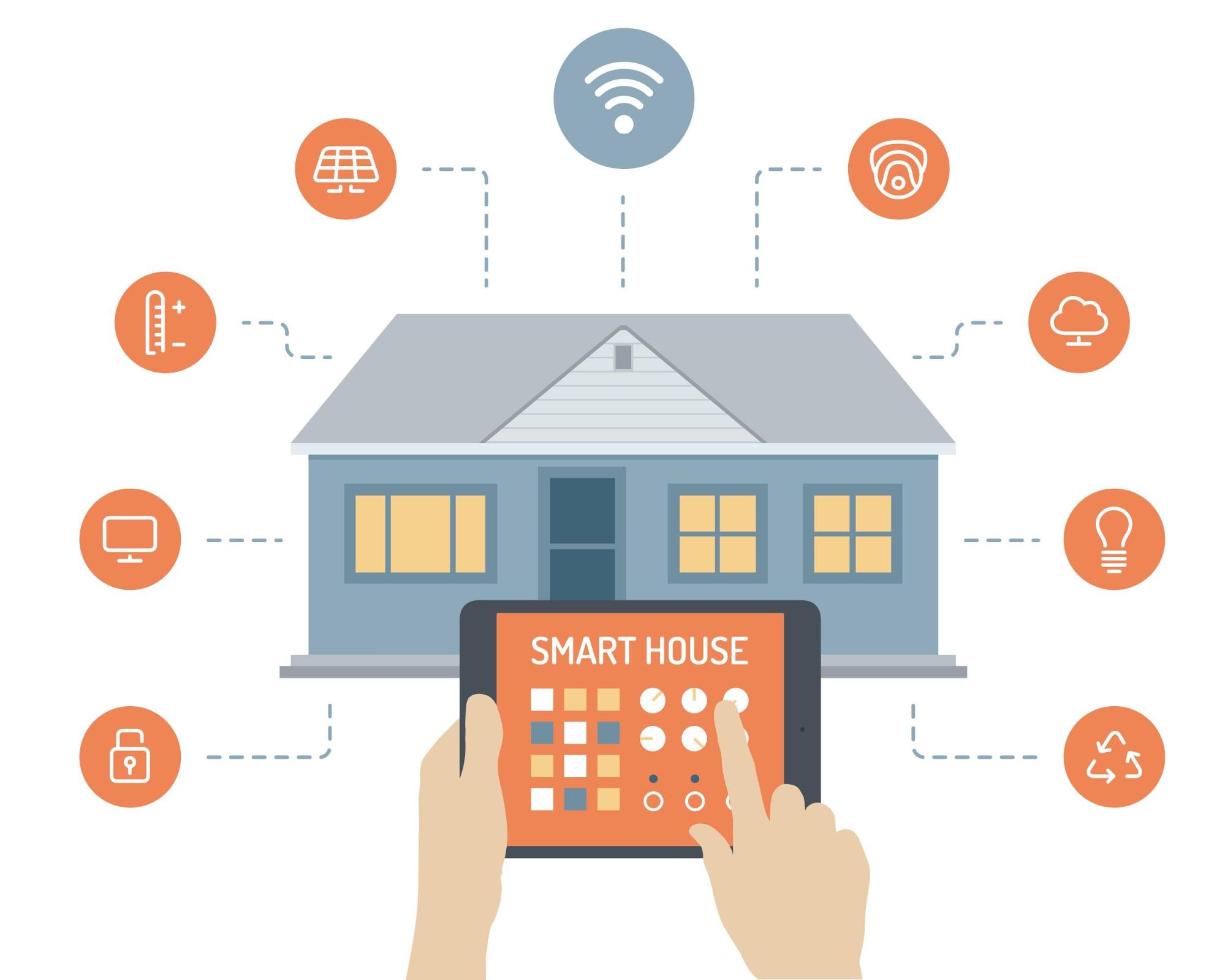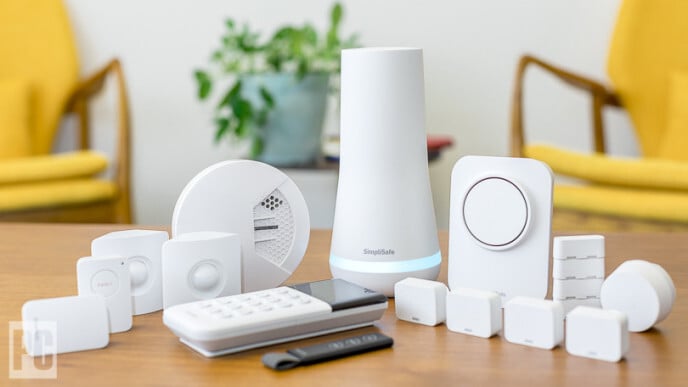Smart homes have changed how we live, and Linux-based systems lead this change. Linux is known for its flexibility and customizability. This makes it perfect for smart home systems.
Linux’s open-source nature means it can be tailored to fit your needs. This is great for smart home automation. It offers better security, more device compatibility, and works well with many IoT devices.
Linux smart home systems make controlling and monitoring devices easy. The community around Linux smart homes is always growing. As smart home tech becomes more popular, Linux systems will play a bigger role.

Using Linux for smart home automation has many benefits. These systems are easy to use, thanks to their user-friendly interfaces. As more people want smart home tech, Linux systems are ready to meet their needs.
Introduction to Linux Smart Home
Linux-based systems are key in the evolving smart home market. They offer flexibility, customizability, and are open-source. This makes them a top choice for many homeowners.
They work well with many devices and provide a secure platform. This makes Linux-based systems perfect for smart home automation.
Key Takeaways
- Linux-based smart home operating systems are becoming increasingly popular due to their flexibility and customizability.
- Open-source smart home systems offer enhanced security and better device compatibility.
- Linux smart home systems can integrate with a wide range of IoT devices.
- The use of Linux-based systems for smart home automation is on the rise.
- Smart home operating systems provide a user-friendly interface for managing smart devices.
- Linux-based systems are well-positioned to meet the needs of homeowners looking for a reliable and secure platform.
- The open-source nature of Linux makes it an ideal choice for smart home automation.
Understanding Linux-Based Smart Home Operating Systems
Linux-based IoT devices are gaining popularity in smart homes. This is because Linux is stable and secure, making it perfect for home automation. It also has a huge community of developers, offering lots of customization and support.
A smart home system needs to manage devices, set up automation rules, and have a user-friendly interface. Linux systems are strong in these areas. They help devices work together smoothly. Home automation with Linux makes controlling and monitoring devices easy, making life more convenient.
- Customization: Users can make their system fit their needs and likes.
- Community-driven development: The Linux community keeps improving and adding to the system.
- Avoidance of vendor lock-in: Linux lets users choose their own path, not being stuck with one vendor.
In smart home tech, Linux-based IoT devices are a strong and adaptable choice. They help users build a smart home that’s efficient, easy to use, and safe.
The Historical Development of Smart Home Technology
The idea of smart homes has been around for decades. The first attempts at automated homes started in the 1960s. Since then, smart home tech has grown a lot. This growth is thanks to smart home security, voice assistants, and smart home hubs.
Some important moments in smart home tech include:
- The first smart thermostat came out in the 1970s
- The 1980s saw the first home automation systems
- In the 2010s, voice assistants like Amazon’s Alexa were introduced
- Smart home hubs like Samsung’s SmartThings were launched, making it easier to connect devices
Today, smart home tech is more advanced than ever. It focuses on smart home security and making life easier. Homeowners can control and check their homes from anywhere. This makes managing daily life simpler.
The history of smart home tech shows our drive for better living. As tech keeps improving, we’ll see even more exciting changes in smart home tech.
Key Features of Modern Linux Smart Home Platforms
Modern Linux smart home platforms have many features that make them great for smart home automation. They can support many IoT devices, letting users control them all from one place. This is thanks to Linux’s open-source design, which lets developers add support for different devices.
These platforms also focus on keeping your data safe and private. They handle your data securely, so you can feel safe when using your smart home devices. Smart home automation is now more secure and easy to use, thanks to Linux’s strong security.
Security and Privacy Considerations
- Secure data handling and storage
- Encryption and access control
- Regular security updates and patches
Linux smart home platforms also make it easy to connect and control different IoT devices. They have user-friendly interfaces that make it simple to manage your smart home. This makes controlling your devices easy and fun.
Device Compatibility and Integration
Linux smart home platforms support a wide range of IoT devices. This makes it simple to build a smart home that fits your needs. Whether you want to control lights, temperature, or security, Linux offers a flexible solution.
Popular Linux-Based Smart Home Operating Systems
Several Linux-based operating systems are top picks for open-source smart home solutions. They are known for being flexible and customizable. These systems work well with many smart devices, making your home smart and efficient.
Linux-based smart home operating systems are very popular. They offer flexibility and work with lots of devices. This is great for Linux-based IoT, where everything needs to work together well.
Using Linux-based systems for smart homes lets you customize them to fit your needs. Because they are open-source, many people can help improve them. This means you can have a smart home that’s just right for you, with all devices working together smoothly.
OpenHAB and Home Assistant are two well-known Linux-based systems. They are easy to use and work with many devices. These systems are perfect for creating a complete and integrated open-source smart home. They use Linux-based IoT for a smooth and efficient smart home experience.
Setting Up Your Linux Smart Home Hub
To start with your Linux smart home hub, pick the right hardware and install the OS. This might seem hard, but with the right help, you can set up your smart home hubs quickly. Think about what your Linux smart home needs in terms of hardware and performance.
Here are the basic hardware needs:
- A compatible single-board computer or microcontroller
- A power supply unit
- A storage device, such as an SD card or hard drive
- Networking equipment, such as a router and Ethernet cables
With your hardware ready, start the installation process. This means putting the Linux smart home OS on your device and setting up your network. You might also need to add software for home automation.
After setting up, do some initial configuration steps. This includes setting up user accounts and adjusting device settings. Once done, you’re all set to dive into Linux smart home and home automation with your smart home hubs.
The Evolution of Linux-Based Smart Home Operating Systems
The smart home technology world has changed a lot in recent years. Linux-based IoT solutions have been key in this change. These systems have seen big improvements, like better device support and stronger security.
These changes have made smart homes better and opened the door for more community projects. This is thanks to the open-source smart home movement. It lets developers and users work together, making smart homes more innovative and affordable.
Some important parts of Linux-based smart home systems’ growth include:
- Enhanced device compatibility, allowing for seamless integration of various smart devices
- Advanced security features, providing robust protection against potential threats and vulnerabilities
- Community-driven projects, which have contributed significantly to the development and refinement of Linux-based smart home systems
These advancements have moved the smart home industry forward. Linux-based IoT solutions are leading this progress.
Integrating Smart Devices with Linux OS
Adding IoT devices to a Linux smart home system brings many benefits. It offers flexibility and lets users customize their setup. With Linux smart home automation, controlling and monitoring devices is easy. Users need to know about communication protocols like Zigbee or Z-Wave to connect devices.
Tools like OpenHAB and Home Assistant make managing devices simple. They have user-friendly interfaces for setting up and controlling smart devices. It’s important to check if devices work well together and if they can connect to the network.
For fixing common problems, users can look at online forums and device manuals. Using Linux smart home automation, users can make a smart home that fits their needs perfectly.
Important things to think about when adding smart devices to Linux OS include:
- Device compatibility: Making sure devices work with the Linux smart home system
- Network connectivity: Setting up devices to connect to the network smoothly
- Customization: Using tools to change device settings and create automation scripts
Troubleshooting Common Linux Smart Home Issues
Setting up a Linux-based smart home can lead to various problems. These issues can affect your smart home’s security, voice assistants, and hubs. It’s crucial to find and fix these problems quickly for a smooth experience.
Common problems include network issues, device compatibility, and performance optimization. These can be annoying, but there are ways to solve them. For example, checking your network settings and making sure devices work with your Linux system can fix connectivity problems.
To improve system performance, you can:
- Regularly update your operating system and software
- Keep an eye on system resources and usage
- Adjust settings for better performance
By following these steps and being proactive, your Linux smart home will work well. This means a secure and easy smart home experience with voice assistants and hubs.

Also, make sure all devices are set up right and hubs are configured well. This helps avoid problems and ensures a smooth experience. Troubleshooting and fixing common issues lets you enjoy your Linux smart home fully. You’ll get better security and easy voice assistant use.
Future Trends in Linux Smart Home Technology
The smart home world is always changing, and Linux is leading the way. Looking ahead, open-source smart home systems will be key. We’ll see new, cool ways to control our homes with Linux-based IoT devices.
Some big trends for Linux smart homes include:
- More people using smart home operating systems based on Linux
- Focus on keeping homes safe and private with open-source smart home systems
- More devices and gadgets working with Linux-based IoT tech
These trends will bring exciting changes to smart home tech. With
In the next few years, we’ll see more open-source smart home systems. This means users will have more control over their devices. With smart home operating systems based on Linux, our homes will work together better.
Conclusion: The Future of Smart Home Computing with Linux
Linux-based smart home operating systems are set to change the future of home automation. They offer a strong and adaptable base. Their open-source nature, solid security, and strong community backing make them key players in the smart home technology world.
Looking to the future, Linux smart home systems will keep getting better. They will use new tech like AI, machine learning, and edge computing. Homeowners will be able to make their homes truly their own, thanks to customization and integration with many devices.
The Linux community’s focus on open-source innovation means these systems will keep leading the way. As people want more privacy, security, and eco-friendliness in their homes, Linux will meet those needs.
FAQ
What is a Linux-based smart home operating system?
A Linux-based smart home operating system is a software platform. It controls and automates devices in a smart home. It uses the Linux operating system for its flexibility and customizability.
Why is Linux an ideal choice for smart home automation?
Linux is great for smart home automation because it’s stable and secure. It’s also customizable and has a big community of users. This means it works well with many devices and keeps your data safe.
What are the core components of a Linux-based smart home operating system?
A Linux-based smart home system has a few key parts. These include managing devices, setting up automation rules, a user interface, and security features. Together, they help control and automate your smart home devices smoothly.
What are the benefits of using an open-source architecture for smart home systems?
Using an open-source architecture like Linux has many benefits. It lets you customize the system to fit your needs. It also avoids vendor lock-in and benefits from community support. This means you can get help and updates from many users.
What are some popular Linux-based smart home operating systems?
Popular Linux-based smart home systems include Home Assistant, openHAB, and Domoticz. They offer lots of features and support for many IoT devices. They also have active communities that help improve them.
How do I set up a Linux smart home hub?
Setting up a Linux smart home hub involves a few steps. First, choose the right hardware and install the operating system. Then, set up user accounts, configure network settings, and install necessary software packages.
What are some common issues that may arise with Linux-based smart home systems, and how can they be troubleshot?
Issues with Linux-based smart home systems can include network problems and device compatibility. To fix these, check your network settings and update device drivers. You can also improve system performance through various techniques.
What are the future trends in Linux smart home technology?
The future of Linux smart home technology looks exciting. It will include new technologies like artificial intelligence and 5G networks. These advancements will lead to more innovation in the smart home market, with Linux playing a big role.










